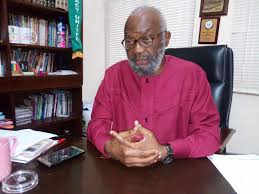NEWS
Cleric Urges Muslim Faithful to Obtain Documentation for Mosques to Avoid Property Forfeiture

The Chief Imam of Lagos, Sheikh Sulaimon Abu, has urged Muslim communities to have proper documentation of their Mosque property to avoid forfeiting them to government in future.
Abu made the appeal during a one-day sensitisation programme tagged “Mosque Documentation in Lagos State, held in Lagos on Saturday.
He said there were lots of gaps among the Muslim communities concerning the Islamic faith in Lagos.
Abu said that in any place where there was government, there were standards and processes, adding that the Qur’an emphasized on proper documentation of properties.
“In respect of Mosque building, there must be processing such as approval because each state has its own standard, and fore instance in Lagos, there is what we call Master Plan.
” Before embarking on Mosque building, one must follow the due process by approaching the Ministry of Land for proper advice and information.
“At the divisional level, we are going to create legal units to synergise with the Muslim communities in processing proper documentation of Mosque property,” Abu said.
He also pleaded with Nigerians to stop building houses that would block water channel, adding that people were being affected by flooding from water blockage.
The chief imam said that flooding was caused by human factor and urged Lagos residents to obey the law of the land to enable them to coexist peacefully in the society.
A legal practitioner in Lagos, with over 30 years experience, mr Musediq Sanni, said he had discovered from 13 Mosques, cases he handled in Lagos that they lacked proper documentation.
Sanni who was also the convener of the programme, said that Al Qur’an had stated that when there was a contract, it should be written.
He said that when Prophet Muhammad (PBUH) got the first Mosque land in Medina, he told his disciples that he would pay for the land and write it down.
Sanni said that the sensitisation would continue in all the Muslims divisions in Lagos, to assist them on documentation.
The Chief Judge of Lagos, Mr Kazeem Alogba, who was represented by Chief Registrar, Lagos State Judiciary, Mr Tajudeen Elias, commended the convener for sensitising Lagos clerics to the need to document their land property and Mosque projects.
“It has been unfortunate that have been happening of recent where people are not having proper documentation by not complying with the physical planning directive of Lagos State.
” This sensitisation will further reduce incidents of demolition of illegal lands,”Alogba said.
He advised property owners to get proper documentation and also to comply with Lagos State Law to avoid loss of property.
The former Special Adviser on Communication to the ex-Governor of Lagos, Mr Hakeem Bello, said according to Sanni, that many mosque property being given to communities had been collected by deceased relations due to improper documentation.
Bello said that the programme was to enlighten the Muslim communities on how to document property, to avoid forfeiture.
He said Mr Sanni’s efforts were to enable Lagos Muslim communities to realise the provisions of the Constitution that required citizens to comply with the law.
Bello urged property owners to do proper documentation according to the law to avoid loss in future.
One of the lecturers, Alhaji Olawale Ojikutu of Land Bureau, said that land and property were most significant assets of any individual or group, adding that many societies had introduced individual and collective control over land.
He said that land provided major source of conflicts in urban and rural societies around the world, adding that land created feud among families and neighbours which could be traced back to conflicting claims over inheritance, boundaries and rights.
Ojikutu said that land property was a legal document that served as evidence for ownership of landed properties which also gave the ownership right to control how land would be used.
“Various land ownership structure had existed in Nigeria before and after the independence in 1960.
“The current policy instrument guiding land allocation and ownership was promulgated on the 26th March 1978 as Land Use Act, embedded in the constitution of the country.
” The land use act 1978, it must be said, has not destroyed or fundamentally altered the concept of land ownership in Nigeria that was in existence before its promulgation in 1978,” Ojikutu said.
He mentioned some requirements for Certificate of Occupancy such as duly completed application, survey plan, and application letter addressed to the Executive Secretary, Land Use and Allocation Committee.
A General Practitioner, Muhammed Iskil Lawal, said all Mosques built belonged to Allah, adding that God said in Qur’an that who ever built mosque for Him that He had built house for such person in paradise.
Lawal said that one third of deceased property could be given to relations, communities and wife if the property owner stated in the will before the demise of the owner.
A lawyer, Shakirullah Obale, expressed the need for mosque documentation for proper ownership, adding that he had attended to five mosque matters.
He added that after the demise of the owners, that beneficiaries usually came to claim ownership.
“Most of the Mosques being donated to communities have no proper documentation. Mosque is a landed property in respect of structure being put on it.
“For transfer of property, there must be document, such as Deed of Assignment, and without that, nothing has been given.
“The only benefit that persons may have is if the mosque has taken the possession of the property for 12 years, the issue of limitation law can now come in,” Lawal said.
He said that any Church or Mosque property without any documentation could be forfeited, except they had taken over the possession for over 12 years.(NAN).
NEWS
SPEAKER NAMES REP. UGBOR CHAIRMAN COMMITTEE ON SINGLE-USE PLASTIC BAN

Speaker House of Representatives Rt. Hon. Tajudeen Abbas has appointed Hon. Terseer Ugbor as Chairman Ad-hoc Committee on Single-Use Plastic Ban in Nigeria.The committee is mandated to access the preparedness, coordination, and roles of relevant federal agencies in implementing the planned ban on single-use plastics in Nigeria, with a view to ensuring effective enforcement, public awareness, and environmental sustainability.
The committee will also engage with the private sector stakeholders to access their preparedness to eliminate single-use plastics from their operations. The bold initiative to ban single-use plastics is a significant stride towards combating plastic pollution in Nigeria. According to reports, Nigeria ranks as the ninth-largest contributor to plastic pollution globally, generating approximately 2.5 million tonnes of plastic waste annually. Alarmingly, over 70% of this waste is discarded into landfills, waterways, or the ocean, posing hazards to both the environment and public health.The Deputy Chairman Committee on Environment will assume the notable role of heading the committee and ensuring the effective implementation of a single-use plastic ban in Nigeria. Hon. Ugbor has been an advocate for better environmental laws and policies. He sponsored the Endangered Species Conservation and Protection Bill, which has passed in the House of Representatives. He also sponsored the Environmental Impact Assessment (EIA) Ammendement Bill. He is also responsible for the End-of-Life Vehicle Regulations amongst others.Previously, Hon. Ugbor served as Chairman of the Ad-hoc Committee on Student Loans and Access to Higher Education, where he organised the first legislative summit on student loans in the National Assembly and proposed extensive ammendments to the students loans bill which was eventually passed into law. Hon. Terseer Ugbor is a thorough professional and a consultant in the area of environmental sustainability, resource recovery, and climate change.Dagu FredS.A Media and Publicity to Hon. Terseer Ugbor.24th July, 2025.NEWS
Return to PDP, Damagum Begs Defected Members

By Johnson Eyiangho, Abuja
The Peoples Democratic Party (PDP) has called on its founding members and others, who have left the party for reason or the other, to return, assuring it is willing to welcome them back to the fold.
Acting National Chairman of the PDP, Amb.
Umar Damagum, made the appeal at a meeting convened by the founding members of the party in Abuja on Wednesday as part of efforts to resolve lingering internal crisis within the party.Damagum said, “Let it be said and known that our doors remain open to those who wish to return, and it is my earnest prayers that in their return, they may rediscover themselves. After all, we are still the party that gave many their first political home.
“But we must also confront the hard truth, much of the injury the PDP has suffered has been self-inflicted. From the Obasanjo era to this moment, we have too often jettisoned ideology in favour of personal ambition.
“This has cost us dearly. Yet, there is still a beauty that exists only in the PDP; our founding vision, our commitment to internal democracy, our enduring mechanisms for dialogue and reconciliation, and our true national outlook. These are not ordinary attributes. They are the very pillars that made and have sustained the PDP as the bedrock of Nigeria’s democratic journey, and they remain our guiding strength today.”
However, former Governor of Niger State, Babangida Aliyu, countered the PDP Acting National Chairman, describing the party members who had defected as nomadic politicians, who cannot remain in the fold.
Aliyu said, “I heard both the (acting) chairman and the chairman of Governors Forum have been very diplomatic and saying, come back, come back. No, you don’t invite nomadic politicians back to your place. These were people with a history of nomadism.
“In nomadic life, your own selfish interest becomes more important than the interest of the people. So we need to understand that the lack of discipline has created this problem.
“We cannot continue like this, knowing that the black sheep in the family keep on destroying whatever we are building. And then you say, come back. In fact, the most shocking time, the most shocking period was 2019.
“Our constitution is specific. You leave the party; you join the queue. The party is not just to win elections. The party is also to ensure the culture of selling real, principled politics. So even if we don’t win elections, but we are one united, principled party, we will be recognized. Please, let us pay attention to what we should be doing, rather than looking at those people who will never, never, ever think of you, but only think of themselves.”
NEWS
As Nigerian Youths Rise against Tobacco Abuse

By Abiemwense Moru
By happenstance, 16-year-old Blessing Obiabo found herself on the frontline of a national movement.
Obiabo, a student of Lyngra Private Montessori School in Karu, Nasarawa State, found her voice the day Cedars Refuge Foundation (CRF) brought its anti-tobacco campaign to her school.
“We are not fools; this is our future, and we are taking it back,” she said.
Obiabo’s declaration mirrors a growing wave of youth-led resistance sweeping across Nigeria, fueled by the CRF’s Students Congress Against Tobacco (SCAT) initiative.
The programme, inaugurated under the banner of a “Tobacco-free Revolution,” is a response to what CRF describes as a calculated and aggressive invasion by the tobacco industry into the lives of young Nigerians.
The Executive Director of CRF, Mr Peter Unekwu-Ojo, minced no words at the campaign inauguration in Karu.
“The tobacco industry is a well-dressed cartel selling flavoured slavery.
“They are not selling lifestyle; they are selling addiction, bubble-wrapped in mango flourish and influencer smiles.”
According to Unekwu-Ojo, the tactics of the tobacco industry have become more deceptive than ever.
“Gone are the days of plain cigarettes; in their place are brightly-packaged e-cigarettes, vapes, and other nicotine products, flavoured, flashy, and dangerously appealing to teenagers.
“It is the same poison, just packaged in sleek tech and tropical flavours.
“These flavoured products, often promoted through digital marketing and pop culture influencers, create the illusion of harmless fun, masking the reality of addiction and long-term health consequences.”
The SCAT programme, now active in several schools across Nasarawa and Abuja, was created to expose and counter these tactics.
It promotes in-school advocacy, peer-led clubs, creative campaigns, and dialogues with teachers, parents, and community leaders.
Unekwu-Ojo emphasised the call for urgent reforms, including a nationwide ban on flavoured tobacco and nicotine products, higher tobacco taxes, strict penalties for marketing to minors, and the enforcement of school-based prevention programmes.
“If we do not protect the future in classrooms, we will be fighting addiction in clinics,” he warned.
Mr Abba Owoicho, CRF’s Programme/Operations Officer, weighed in.
“We are witnessing a silent epidemic thriving on ignorance and regulatory loopholes.
“SCAT is not just a campaign; it is a counter-offensive,” he said.
At the school level, educators are stepping up.
Mrs Blessing Onu, Head Teacher at Lyngra, welcomed the initiative.
“Our students will not be left defenceless in the face of such a manipulative industry,” she said, announcing the establishment of a Tobacco-Free Club in the school.
Mr Pius Nnaemeka, a senior teacher, appealed directly to national authorities.
“If we continue to play soft while our children inhale poison, history will not forgive us.
“The government must outlaw flavoured tobacco, fund preventive education, and support civil society groups championing this cause,” he said.
These school-based actions are mirrored across other institutions.
At Klinnicaps Academy in Koroduma, another CRF outreach event themed “Exposing Lies, Protecting Lives” engaged students in interactive sessions that peeled back the façade of flavoured products.
Unekwu-Ojo told the students that the industries were setting young people up against their future.
“They sandwich their products with glamorous colourful packaging and high-profile adverts, hiding the dangerous consequences of addiction.”
He described the educational sessions as a wake-up call.
“Tobacco use is not a fashion statement; it is a death sentence disguised in shiny colours,” he said.
Mr John Egla, Executive Director of Development Initiatives for Societal Health, reinforced the message: “There is no safe level of smoking.”
He cited global statistics from the 2018 Tobacco Atlas, noting that more than 942 million men and 175 million women worldwide smoke, with rising usage among African youth.
In response, CRF is establishing Tobacco-Free Clubs in at least 10 more schools in Nasarawa State, equipping students with peer leadership and advocacy tools.
The message is resonating beyond classrooms.
In Katsina State, the Commissioner for Health, Alhaji Musa Adamu-Funtua, recently stressed the importance of school-based campaigns.
Speaking during World Tobacco Day celebrations, he warned that a society that allowed the exploitation of its youth by profit-driven tobacco companies is a society at risk.
Adamu-Funtua urged joint efforts among government agencies, civil society, parents and youths.
“Let us choose health over harm, strength over addiction,” he said.
The Civil Society Legislative Advocacy Centre (CISLAC) has also thrown its weight behind tobacco control.
At a recent workshop in Bauchi, its Senior Programme Officer, Mr Solomon Adoga, highlighted tobacco’s role in multiple cancers and reproductive health challenges.
“Tobacco significantly contributes to Nigeria’s cancer burden,” he said.
CISLAC’s Executive Director, Auwal Rafsanjani, called for urgent policy reforms, stronger laws, and intensified awareness campaigns to stem tobacco-related deaths.
Beyond the halls of policy and classrooms, the anti-tobacco wave is being carried by mothers.
In Ilorin, Kwara, a march led by Bundies Care Support Initiative and other groups amplified maternal voices demanding action.
Mrs Funmilayo Osiegbu, Executive Director of the initiative, sounded a note of warning.
“We cannot stand by while our children are exposed to harmful tobacco products.
“We are urging the government to enact policies that shield young people.”
Inspired by international campaigns such as Tobacco-Free Jordan, the Kwara mothers demanded full implementation of Nigeria’s National Tobacco Control Act.
“This includes stricter enforcement of bans on advertising and sponsorship, and stronger measures to prevent youth access,” she said.
Kwara’s Commissioner for Women Affairs, Mrs Afolashade Opeyemi, reaffirmed government’s support.
“The administration has zero tolerance for smoking any substance,” she said.
Also, health experts lend their support.
Prof. Abiodun Afolayan, Chair of the Nigeria Cancer Society in Kwara, warned that lung cancer had become the most common cancer worldwide, driven largely by smoking.
“Often, the damage only appears when it is too late,” he said.
Mr Lekan Mikail, Special Adviser on Drug Abuse to the Kwara Governor, urged parents to stay vigilant.
“We must protect our children from this slow and silent killer,” he said.
As the SCAT initiative prepares to expand to 30 schools by 2025, it is clear that a national youth-driven movement is taking root.
From Obiabo’s defiance to policymakers’ endorsements, Nigeria is witnessing a shift in its tobacco control landscape.
But for CRF’s Unekwu-Ojo, the work is far from over.
“Every child deserves a future free from the industry’s traps, flavoured nicotine, flashy adverts, and peer-induced pressure,” he said.
His words echo in classrooms, streets, and government chambers across the country; the call is no longer just to awareness, but to action.
Mrs Precious Ojiaku, Dean of Studies at Klinnicaps Academy, said tobacco had no place in the future of Nigerian youth.
“Living a morally grounded life and rejecting these traps is the strongest resistance we can teach,” she said.
With the ongoing concerted efforts, stakeholders believe the threat posed by tobacco can be contained.(NAN)
| ReplyReply allForwardAdd reaction |



















